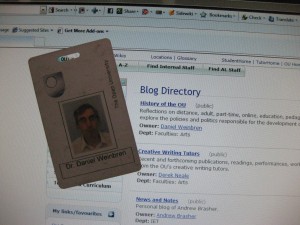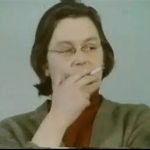Posted on April 18th, 2011 at 8:40 am by Daniel Weinbren
The Anglo-Portuguese Treaty of 1373, ratified at the Treaty of Windsor in 1386 is one of the oldest international alliances in the world. The OU is hoping to strengthen cordial relations between the UK (the UK took over the Anglo part of the alliance) and Portugal by building up links at a conference being held in Lisbon. Representing a third of the participants who have travelled from HEFCE institutions, (London, Oxford and Cambridge are also represented here) Chris Bissell and Dan Weinbren have ensured that blended, supported distance education has not been marginalised at this international conference about the history of universities. Their interests are echoed in other contributions. One, on ‘massification’ in the Portuguese HE sector since the 1974 revolution, is chronologically comparable to the period of the early years of the OU while another, on the role of the informal sector in the construction of the discipline of history in the Netherlands, might lead to comparisons with FACHRS (see earlier posting). In addition, Dan’s paper, which assesses the uses of the market metaphor, was prefigured in both the welcomer’s address and the first keynote, which was entitled ‘The transformation of the universities: from the church to the market’.
For those unfamiliar with Lisbon there are similarities with parts of the UK. For example, the steep hills, trams and fado (a cultural form which celebrates misery) might make it easier for visitors who are homesick for Sheffield. Even those seeking Yorkshire weather will not be disappointed. It poured with rain on 18th April.
Posted in Nations and regions | No Comments »
Posted on April 18th, 2011 at 8:37 am by Daniel Weinbren
Intending to make an impact at least as momentous as the earthquake which rocked the Portuguese capital in 1755, though aiming to be considerably less destructive, and dreaming of being received as raptuously as the Carnation Revolution, which started in Lisbon in 1974, Chris Bissell and Dan Weinbren, both from The Open University, will be making contributions to the History of European Universities. Challenges and transformations conference currently being held at the oldest university in Portugal, the University of Lisbon (founded 1288-90). Chris Bissell’s topic is ‘The Open University of the United Kingdom’ while Dan Weinbren is going to be talking on ‘Openness, universities and national identities’. He will be arguing that while the market model is widely used as a metaphor for understanding universities, and that specifically the ideas of Clayton Christensen have been applied to contextualise the development of the OU, there are wider political structures which also need to be considered. He will propose new parameters which can be employed to understand the impact of the OU.
Posted in Ideas, Nations and regions | No Comments »
Posted on April 6th, 2011 at 3:03 pm by Daniel Weinbren
Edward Thompson was responsible for some significant developments within the field of history, notably The Making of the English Working Class. He also worked for the WEA and recently an article (possibly unpublished) for the WEA magazine, Highway by him, about the OU has come into my possession (thanks to Malcolm Chase). Although undated there is a reference to the Sunday Citizen (Reynolds’ News as was) which ceased trading in 1967. There are other references which make it clear that the way in which the OU was to be structured had not reached the author’s ears (and indeed may well not have been devised).
Thompson argued against the OU (which he consistently referred to by its older name of the University of the Air) because it appeared to him to offer centralised lectures, not ‘the essential mutuality of the teaching relationship… the controlled dialogue between teacher and class’. He suggested that
The limitation of the television screen is not only that the student cannot question it or answer back; it is also that the man on the screen is blind Read the rest of this entry »
Posted in Methods | No Comments »
Posted on April 6th, 2011 at 12:04 am by Daniel Weinbren

Top of the blogs listing for the History of the OU, as we post this posting. With this, our 120th posting, we have averaged over two postings a week for each week since we started posting a year ago. If you flick through the material you’ll find we’ve used film clips, photos and links to relevant bits and pieces. But which has been the material which has supported your learning? Provided a contact? Given you a laugh? We welcome comments and ideas relating to the blog. And no, we didn’t solicit the below tweets.


Posted in Promotion | No Comments »
Posted on April 5th, 2011 at 8:25 pm by Daniel Weinbren
2011 marks the conclusion of the first two decades of an European association for distance learning open to institutions and individuals. This not-for-profit company, EDEN, the European Distance and E-learning Network, is interested in formal and non-formal education and training at all levels. It holds conferences, supports the European Journal of Open, Distance and E-Learning and provides support and advice for a range of projects. It has close associations with the OU, for example Alan Tait is a former President and former VC, Sitr John Daniel is to address the EDEN annual conference in June 2011. For more on ‘this other Eden, demi-paradise’, as Shakespeare almost called it and for information about the forthcoming conference click here.
Posted in Nations and regions, People | No Comments »
Posted on April 4th, 2011 at 10:19 am by Daniel Weinbren
The death in January this year of Eric Robinson is an event which could be noted by historians of the OU because the 1966 White Paper which became the basis for the OU was published within months of the decision to create the polytechnics with which Robinson was so closely associated. The title of his book, The New Polytechnics: The People’s Universities (1968) indicates that there were competing ideas as to the best way to open up higher education and support students living at home. He starts the text with the words:
The title of his book, The New Polytechnics: The People’s Universities (1968) indicates that there were competing ideas as to the best way to open up higher education and support students living at home. He starts the text with the words:
Sooner or later this country must face a comprehensive form of education beyond school – a reform which will bring higher education out of the ivory towers and make it available to all. … The future pattern of higher education in this country can be set in the development of these institutions [ie the polytechnics] as comprehensive people’s universities. This book is written in the hope of accelerating this process.
His vision of education might well have been shared by many staff at the OU. While the approaches of many polytechnics differed from the approach of the OU, there were some common roots. In a critique of the ‘disaster’ of Blair’s educational policies Robinson stressed the importance of ‘democratic control of education’ and concluded that
Socialist education is to promote the power of the people, to make democracy work and to empower individuals to direct their own lives and not to tolerate being pushed around by those with “merit”.
Posted in Higher education | No Comments »
Posted on April 4th, 2011 at 9:28 am by Daniel Weinbren
That is how AHRC Council member Rick Trainor described the Economic History Society session on ‘The Big Society’.  In recent days there has been much debate about the role of the AHRC in regard to The Big Society. In regard to this matter there are comments and further links available via the Times Higher and the New Statesman and there is an account by James Sumner. The academic conference debate attended by Professor Trainor was was an example of academics coming together to assess the idea within a historical context. The government might not frame its social, educational and economic policies in the light of the ideas constructed and contested by academics but it now has to option to consider their views and analysis.
In recent days there has been much debate about the role of the AHRC in regard to The Big Society. In regard to this matter there are comments and further links available via the Times Higher and the New Statesman and there is an account by James Sumner. The academic conference debate attended by Professor Trainor was was an example of academics coming together to assess the idea within a historical context. The government might not frame its social, educational and economic policies in the light of the ideas constructed and contested by academics but it now has to option to consider their views and analysis.
Posted in Ideas, People | No Comments »
Posted on April 1st, 2011 at 9:00 am by Daniel Weinbren
Off to the Economic History Society conference to contribute a paper on ‘The Big Society’ and listen to papers on a variety of subjects.

‘Universities’ Bernard Crick argued, ‘are part of society and, in both senses of the word, a critical part which should be playing a major role in the wider objectives of creating a citizenship culture’ (Bernard Crick, Essays on citizenship, 2000, p. 145). Taking the example of the role of The Open University indicates the benefits of conceptualising the relationship between the Big Society and the Big State as reciprocal, rather than employing dichotomous taxonomy. Read the rest of this entry »
Posted in Politics | No Comments »
Posted on March 30th, 2011 at 11:57 am by Rachel Garnham
 When discussing the history of The Open University and the impact it has made on the world of higher education more widely, one of the aspects most often mentioned is the impact of the course team. This collective approach to course production stood in contrast to the individually prepared lectures offered in conventional institutions. Read the rest of this entry »
When discussing the history of The Open University and the impact it has made on the world of higher education more widely, one of the aspects most often mentioned is the impact of the course team. This collective approach to course production stood in contrast to the individually prepared lectures offered in conventional institutions. Read the rest of this entry »
Posted in History of the OU | No Comments »
Posted on March 23rd, 2011 at 9:40 am by Daniel Weinbren

Hilary Perraton was closely involved with the National Extension College, NEC, a precusor of the OU, from 1964 until 1971. He promoted the idea that a multi-media teaching programme is likely to be more effective than one which relies on a single medium. He went on to become a Co-Director of the International Extension College, a non-profit consultative organization on distance teaching and to work at the Commonwealth Secretariat, at the International Research Foundation for Open Learning and to chair the Commonwealth Scholarship Commission. Read the rest of this entry »
Posted in People | No Comments »






